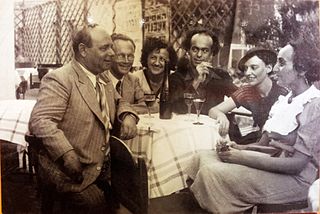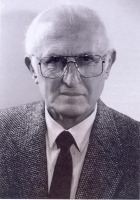 W
WShmuel Yosef Agnon was a Nobel Prize laureate writer and was one of the central figures of modern Hebrew fiction. In Hebrew, he is known by the acronym Shai Agnon. In English, his works are published under the name S. Y. Agnon.
 W
WNathan Alterman was an Israeli poet, playwright, journalist, and translator. Though never holding any elected office, Alterman was highly influential in Socialist Zionist politics, both before and after the establishment of the State of Israel.
 W
WAharon Amir was an Israeli Hebrew poet, a literary translator and a writer.
 W
WAharon Appelfeld was an Israeli novelist and Holocaust survivor.
 W
WHanoch Bartov was an Israeli author and journalist.
 W
WYocheved Bat-Miriam was an Israeli poet. She is unusual among Hebrew poets in expressing nostalgia for the landscapes of the country of her birth. Yocheved migrated to British Palestine, later to be called Israel, in 1928. Her first book of poetry, Merahok was published in 1929. In 1948, her son Nahum (Zuzik) Hazaz from the writer Haim Hazaz died in the 1947–1949 Palestine war. Since then she never wrote a poem again.
 W
WIsaac Dov Berkowitz, was an Israeli author and Yiddish-Hebrew translator.
 W
WYehuda Burla was an Israeli author.
 W
WYa'akov Cahan or Kahan was an Israeli poet, playwright, translator, writer and Hebrew linguist.
 W
WJacob Fichman also transliterated as Yakov Fichman, was an acclaimed Hebrew poet, essayist and literary critic.
 W
WIda Fink was a Polish-Israeli author who wrote about the Holocaust in Polish.
 W
WEzra Fleischer was a Romanian-Israeli Hebrew-language poet and philologist.
 W
WLeah Goldberg or Lea Goldberg was a prolific Hebrew-language poet, author, playwright, literary translator, and comparative literary researcher.
 W
WUri Zvi Greenberg was an acclaimed Israeli poet and journalist who wrote in Yiddish and Hebrew.
 W
WEmile Shukri Habibi was an Israeli Arab writer of Arabic literature and a politician who served as a member of the Knesset for the communist parties Maki and Rakah.
 W
WAvigdor Hameiri was an Israeli author.
 W
WYehudit Hendel was an award-winning Israeli author. She wrote novels, short stories, and non-fiction.
 W
WAbba Kovner was a Jewish Hebrew and Yiddish poet, writer and partisan leader. In the Vilna Ghetto, his manifesto was the first time that a target of the Holocaust identified the German plan to murder all Jews. His attempt to organize a ghetto uprising failed, but he fled into the forest, became a Soviet partisan, and survived the war. After the war, Kovner led a secretive organization that aimed to take revenge for the Holocaust by killing six million Germans, but he was arrested by the British before he could carry out his plan. He made aliyah in 1947. Considered one of the greatest poets of modern Israel, he received the Israel Prize in 1970.
 W
WAmos Oz was an Israeli writer, novelist, journalist, and intellectual. He was also a professor of Hebrew literature at Ben-Gurion University of the Negev. From 1967 onwards, Oz was a prominent advocate of a two-state solution to the Israeli–Palestinian conflict.
 W
WDavid Shimoni was an Israeli poet, writer and translator.
 W
WAvraham Shlonsky was a significant and dynamic Israeli poet and editor born in the Russian Empire.
 W
WZalman Shneur was a prolific Yiddish and Hebrew poet and writer. He was nominated for the Nobel Prize in Literature.
 W
WGershon Shofman was an Israeli writer and painter.
 W
WAbraham Sutzkever was an acclaimed Yiddish poet. The New York Times wrote that Sutzkever was "the greatest poet of the Holocaust."
 W
WReuven Tsur is professor emeritus of Hebrew literature and literary theory at Tel Aviv University. He was born in Oradea (Nagyvárad), Romania and his mother tongue is Hungarian.
 W
WAbraham B. Yehoshua is an Israeli novelist, essayist, and playwright, published as A. B. Yehoshua. The New York Times called him the "Israeli Faulkner".
 W
WYizhar Smilansky, known by his pen name S. Yizhar, was an Israeli writer and politician.
 W
WShlomo Zemach was an Israeli author, agriculturalist and early Zionist pioneer.